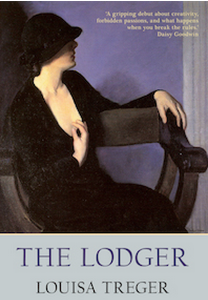Between Two Worlds
“I am alone in my room, between two worlds.” – Sylvia Plath
“I like it better when you’re not working on a book,” my youngest daughter announced the other day at breakfast.
“Really?” I asked, rather taken aback. “Why is that?”
My daughter speared a piece of sausage with her fork and gave me a look.
“Because you have time to cook breakfast. And you hear me when I talk to you.”
I had just signed off on the proofs of my first novel, The Lodger, and was pausing to catch my breath before embarking on the next book. My daughter’s remark started me thinking about the tensions between writing and living: the ways in which the fictional world of one’s story and the real world collide. I’m not talking about to the agonizing early days of The Lodger, during which I sat numbly staring at a blank screen, or indulged in countless deferral activities, like checking emails and making cups of coffee.
I am referring to the later stages, where the characters started coming alive, words flowed and, all of a sudden, the story had me in its grip. I experienced being sucked into my fictional world as an actual physical sensation inside my chest, like being tugged into the centre of a vortex.

Louisa Treger
Don’t get me wrong: writing The Lodger was mostly a wonderful experience. For me, nothing beats the exhilaration of entering an imaginary world which, unlike life, I can order and control as I want.
I am addicted to writing; it’s salvation, as essential as breathing. Without it, I am grumpy and, frankly, a little unhinged. I am sure it’s better for my family that I am fulfilled and doing something I love, even if it’s at the expense of cooked breakfasts and my undivided attention.
Yet having a foot in two worlds is a strange mode of being; the journey between them produces feelings of motion sickness, and can be bumpy. While writing The Lodger, a real-life problem would sometimes linger in my mind, blocking the transition into the world of the book. More often, I was so deeply immersed in my novel that when the time came to fetch my children from school, re-entering my own life was problematic.
Sitting behind the wheel, the route so familiar that the car almost drove by itself, I’d try and haul myself back into the universe of family and practicalities: homework, supper, the daily exchange of news and issues. My fictional world seemed more real and vivid than my life, and I had trouble believing in myself; in my own solidity. I made scores of silly slips in this state, like letting baths overflow, or remembering to put dinner in the oven, but forgetting to switch the oven on.
Often, my characters talked in my head so loudly that I didn’t hear what real people were saying to me, hence my daughter’s breakfast-time comment. My characters grew particularly vocal at 3am, which disrupted not only my sleep but my husband’s as well, because I’d feverishly scribble their conversations into a notebook I kept by the bed, knowing that if I didn’t commit these words safely to paper, they would be lost by morning.

The Lodger, UK cover
My erratic behaviour made me reflect: surely inhabiting more than one reality at the same time is a symptom of madness? Is writing, then, akin to madness? Perhaps it would be more accurate to say that sanity depends on the successful negotiation of the journey back into the real world. And here is the nub of my fear: that I will somehow get lost in transit; I’ll slip into the vacuum or black hole between worlds, unable to find my way home.
Also, I feel guilty about my strong desire to be alone in my room, communing with a bunch of imaginary people (or, in the case of The Lodger, which is biographical fiction, dead people). It takes me away from loved ones. I write with the window blinds drawn, literally shutting out the world. And I emerge, blinking and disoriented, to find that another beautiful day – or even a whole season – has passed me by. But any regret is transient, because there is nothing I would rather do than write.
When writing takes over, I am scared of missing something important in the real world. I might leave a child uncollected at school, or – worse still – not see the emotional needs of my nearest and dearest. Even more acute than the fear of losing sanity is this terror of becoming emotionally disconnected. For a writer, detachment is a necessary condition; it’s a way of protecting one’s creative core. But that doesn’t mean it’s a good thing.
Recently, I had a phone call from my daughter’s school to say that she had injured her thumb during hockey and, although she seemed to be managing, I might want to come and collect her. My book was in full flow, so I left my girl at school – I still feel guilty about it. True, she did cope, and when we went for an x-ray in the late afternoon, the thumb was bruised, and not broken. But if the story hadn’t had me in its sway, she might have had an easy day at home, rather than having to negotiate school with a thumb that was painful and swollen to three times its normal size.
And so, I would like to end by saying this to my family: thank you for bearing with me. Please forgive me if I sometimes look at you without seeing you, or don’t hear you for the clamour of imaginary voices inside my head. I love you.
—
Born in London, Louisa Treger began her career as a classical violinist. She studied at the Royal College of Music and the Guildhall School of Music, and worked as a freelance orchestral player and teacher.
Louisa subsequently turned to literature, gaining a First Class degree and a PhD in English at University College London, where she focused on early twentieth century women’s writing.
Married with three children, she lives in London.
Find out more about Louisa on her website: http://louisatreger.com/
Follow her on twitter: @louisatreger
Buy The Lodger HERE
Category: Contemporary Women Writers, On Writing































I know this book thrall; my characters and imaginary world fill my head, Housework is often only done when visitors come.
But while neglecting dusting is fine, ignoring a child is not. Sorry.
Oh Louise, fantastic article, you’ve hit the proverbial nail right on the head… and like others I seek comfort that I’m not alone in my writerly detachments akin to madness. I’m forever torn between the outer voices (and needs) of my nearest and dearest and the voices of my fictional friends clamming to get out of the draft drawer and tell their tales.
Wow!
Needed to read this today…had a walk and talk with my husband yesterday where I said I’d spent the last 25 years attending to my children’s needs and I wanted to put me first now. I felt like the lowest of criminals and was sure he’d disown me. But he agreed. Whew. I was going to do it anyway! Thank you for making us all realize we are not alone.
I am happy you liked the piece, Suzanne. You are definitely not alone!
Oh! Like the ladies above – so relieved I’m not the only one that forgets my children (and my husband, house, dogs, food…)
Do men struggle in the same way do you think?
I am so happy you liked this, Carlie. I think it’s something that nearly all working women struggle with. And no, I don’t think men feel torn in the same way. They are far better at compartmentalising. They focus on the task at hand, cutting off from other demands.
Thank you, Carlie, you are not alone! And no, I don’t think men struggle in the same way. They are far better at compartmentalising, at focusing on the task in hand without feeling torn by other demands like we do.
This piece resonates strongly as I just decided to concentrate on my writing to finish a novel that I let go more than a year ago, giving into to life pulling me into the real world.
It’s hard not to feel guilty, but teaching our children to honor our gifts is a wonderful lesson.
I am happy the piece strikes a chord,Violet. You are right about teaching our children to honour our gifts. That’s a very positive and constructive view.
Here in my writing-room at 3 am, blinds drawn, dithering before starting my own novel #2, I have just read your excellent, oh-so-resonant! piece — thank you for articulating so many thoughts and feelings I’m glad to learn we share. Best of luck to you and I’ll look for The Lodger!
For some reason, I missed this, Sally. Only just saw it – sorry! Thank you so much for your post. I am glad the piece resonated with you. Best of luck with novel number two!
Thank you for writing about that moment when you consciously chose writing, even though the world was pulling at you. This is shared terrain for women writers. I appreciate your honesty and support your exploration of that fine line between your inner and outer worlds. So many of us are right there with you.
Thank you so much, Norah. It’s great to know this is shared terrain – there is definitely strength in pooling our experiences.
Oh, it is so comforting to read this and learn I’m not alone! Thank you, thank you for your reflections and post. Maybe we writers are all a bit crazy, but isn’t it wonderful? Cannot wait to read The Lodger!
Thank you so much, Christine. I am comforted that the post resonated with you and I am not alone either! We writers are definitely not a normal bunch!!
Thanks for your honesty about “neglecting” your family when immersed in the world of your book. Sure, writing is addictive, but it’s also a pleasure (maybe those two go hand in hand), and I wonder if your family might find your behavior even more erratic if you didn’t have that world to dip into. Since it’s what you need.
Looking forward to your next book …
You are absolutely right, Martha. Wise words!